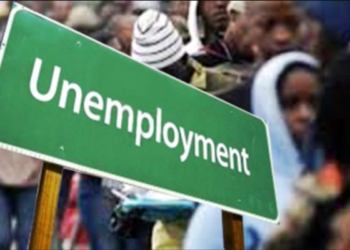Nigeria’s unemployment rate for the third quarter of 2017 was 18.8%, data from the National Bureau of Statistics reveals.
This compares to 16.2% and 14.4% in Q2 and Q1 respectively. Nigeria’s unemployment rate was 7.5% when the Buhari Administration took over at the end of Q1 2015.
Buhari’s Job record
The number of Nigerians unemployed has now grown from 5.5 million at the end of the first quarter of 2015 to 15.9 million in the third quarter of 2017. The Buhari Administration has to date created net, 1,187,000 jobs (mostly underemployed) only since the end of the first quarter of 2015.
Nigeria’s Underemployment data is even worse. The NBS classifies Underemployment has Nigerians engaged in activities that are way below their skill level or qualifications.

According to the data, about 34 million Nigerians remain Unemployed and Underemployed compared to 17.7 million at the end of the first quarter of 2015. Nigeria’s underemployment rate is also at an all time high of 18.8% galloping every year since 2015.
An interesting part of the data reveals the number of Nigerians joining the work force is growing at a faster rate than the number of Nigerians who have jobs. Between 2017 Q3 and 2014 Q4 a total of 12 million joined the labour force while over 4 million left full time employment. This fact has made matters worse for the administration.
Economic Recession
Nigeria experienced 5 straight quarters of negative GDP growth rate between 2015 and the first quarter of 2017. The recession that ensued left the economy in shambles as businesses cut jobs, halted employment and reduce investments. The situation worsened as Nigeria’s disposable income dwindled further dampening demand for goods and services.
Government reaction
The Buhari Administration reacted to the economic recession and years of resource mismanagement by the previous administration in controversial circumstances.
To supporters of the administration, the positive reaction has been the introduction of key policy reforms such as the treasury single account, large deficit driven budgets, social security handouts, direct developmental funding for the agricultural sector and increase in taxes from the informal sector of the economy.
The government also introduced series of capital controls, banning a composite list of 41 imported items from accessing forex from the official window of the CBN.
Critics of the government claim most of these policies are wrongly conceived, which is why the economic condition of millions of Nigerians was yet to improve.
They also cite the absence of market reforms such as removal of fuel subsidies, free float of the naira and unrestricted trade as key policies that may have set Nigeria on a path to sustainable economic growth.
While several other macro-economic indices such as Nigeria’s inflation rate, GDP growth rate, food prices and a stable exchange rate have recorded positive improvements; unemployment remains one of the most important determinant of how well a government has treated its citizens.
The government will have to channel policies towards job creation, especially in the private sector, if it wants its job creation efforts to be effective enough to bring down the unemployment rate.

















